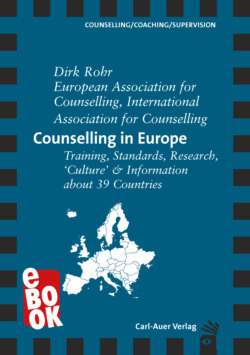Читать книгу Counselling in Europe - Dirk Rohr - Страница 14
На сайте Литреса книга снята с продажи.
2.7 Training Standards
ОглавлениеCourse Work
Refers to in-depth training in counselling, enabling the trainee counsellor to develop the core competencies outlined in the section entitled Training Programme. At best, this will generally be an integrated training within an established training programme, which employs an external examiner, has an appeals procedure and is recognised by the local National Association for Counselling. This training may include any primary academic degree already obtained.
Personal Development
The following are general guidelines for each training programme to be implemented according to their specific theoretical approach. The purpose of this component is to facilitate:
• Awareness of personal issues in work and how these might influence the counselling process;
• Ongoing development in:
intellectual understanding and knowledge
emotional maturity
acceptance of self and others;
• Experience of being in the client role, wherever possible within a formal professional counselling relationship;
• Development of a global perspective of self-concerning the world.
Counselling Practice
It will typically take place within a formalised and contracted counselling arrangement.
Training Requirements
• 450 hours of course work including personal development, theory and skills; A minimum of 50 hours of individual therapy consistent with the model of Practice;
• 100 hours of supervised counselling practice during training.
• An extra 450 hours under Supervision after qualification while working towards Professional accreditation.
The above will usually complete in a minimum of 3 and a maximum of 6 years.
Personal Commitment
From the start of training and post-qualification, Counsellors will:
• Sign their agreement to maintain the relevant codes of ethics and Practice;
• Hold professional liability insurance;
• Have ongoing counselling supervision or peer supervision as required;
• Ensure continuing personal and professional development.
